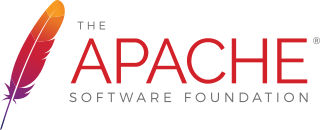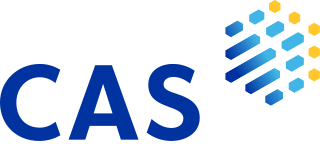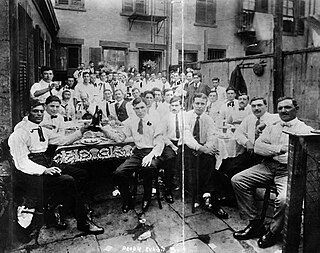
The Apache Software Foundation (ASF) is an American nonprofit corporation to support a number of open source software projects. The ASF was formed from a group of developers of the Apache HTTP Server, and incorporated on March 25, 1999. As of 2021, it includes approximately 1000 members.

The Charter of the United Nations (UN) is the foundational treaty of the United Nations, an intergovernmental organization. It establishes the purposes, governing structure, and overall framework of the UN system, including its six principal organs: the Secretariat, the General Assembly, the Security Council, the Economic and Social Council, the International Court of Justice, and the Trusteeship Council.

VideoLAN is a non-profit organization which develops software for playing video and other media formats. It originally developed two programs for media streaming, VideoLAN Client (VLC) and VideoLAN Server (VLS), but most of the features of VLS have been incorporated into VLC, with the result renamed VLC media player.

CAS is a division of the American Chemical Society. It is a source of chemical information. CAS is located in Columbus, Ohio, United States.

The German Research Foundation is a German research funding organization, which functions as a self-governing institution for the promotion of science and research in the Federal Republic of Germany. In 2019, the DFG had a funding budget of €3.3 billion.

The Foreign Broadcast Information Service (FBIS) was an open source intelligence component of the Central Intelligence Agency's Directorate of Science and Technology. It monitored, translated, and disseminated within the U.S. government openly available news and information from media sources outside the United States. Its headquarters was in Rosslyn, later Reston, Virginia, and it maintained approximately 20 monitoring stations worldwide. In November 2005, it was announced that FBIS would become the newly formed Open Source Center, tasked with the collection and analysis of publicly available intelligence.
Open innovation is a term used to promote an information age mindset toward innovation that runs counter to the secrecy and silo mentality of traditional corporate research labs. The benefits and driving forces behind increased openness have been noted and discussed as far back as the 1960s, especially as it pertains to interfirm cooperation in R&D. Use of the term 'open innovation' in reference to the increasing embrace of external cooperation in a complex world has been promoted in particular by Henry Chesbrough, adjunct professor and faculty director of the Center for Open Innovation of the Haas School of Business at the University of California, and Maire Tecnimont Chair of Open Innovation at Luiss.
Office Open XML is a zipped, XML-based file format developed by Microsoft for representing spreadsheets, charts, presentations and word processing documents. Ecma International standardized the initial version as ECMA-376. ISO and IEC standardized later versions as ISO/IEC 29500.
This comparison only covers software licenses which have a linked Wikipedia article for details and which are approved by at least one of the following expert groups: the Free Software Foundation, the Open Source Initiative, the Debian Project and the Fedora Project. For a list of licenses not specifically intended for software, see List of free-content licences.
The Open Source Geospatial Foundation (OSGeo), is a non-profit non-governmental organization whose mission is to support and promote the collaborative development of open geospatial technologies and data. The foundation was formed in February 2006 to provide financial, organizational and legal support to the broader Free and open-source geospatial community. It also serves as an independent legal entity to which community members can contribute code, funding and other resources.
Knowledge Discovery Metamodel (KDM) is a publicly available specification from the Object Management Group (OMG). KDM is a common intermediate representation for existing software systems and their operating environments, that defines common metadata required for deep semantic integration of Application Lifecycle Management tools. KDM was designed as the OMG's foundation for software modernization, IT portfolio management and software assurance. KDM uses OMG's Meta-Object Facility to define an XMI interchange format between tools that work with existing software as well as an abstract interface (API) for the next-generation assurance and modernization tools. KDM standardizes existing approaches to knowledge discovery in software engineering artifacts, also known as software mining.
A distributed social network or federated social network is an Internet social networking service that is decentralized and distributed across distinct service providers, such as the Fediverse or the IndieWeb. It consists of multiple social websites, where users of each site communicate with users of any of the involved sites. From a societal perspective, one may compare this concept to that of social media being a public utility.
The open-source-software movement is a movement that supports the use of open-source licenses for some or all software, as part of the broader notion of open collaboration. The open-source movement was started to spread the concept/idea of open-source software.
A free license or open license is a license which allows others to reuse another creator’s work as they wish. Without a special license, these uses are normally prohibited by copyright, patent or commercial license. Most free licenses are worldwide, royalty-free, non-exclusive, and perpetual. Free licenses are often the basis of crowdsourcing and crowdfunding projects.

The Brooklyn Camorra or New York Camorra was a loose grouping of early-20th-century organized crime groups that formed among Italian immigrants originating in Naples and the surrounding Campania region living in Greater New York, particularly in Brooklyn. In the early 20th century, the criminal underworld of New York City consisted largely of Italian Harlem-based Sicilians and groups of Neapolitans from Brooklyn, sometimes referred to as the Brooklyn Camorra, as Neapolitan organized crime is referred to as the Camorra. this group had several distinct differences from their more well known counterparts, Namely "different organizational models. While Cosa Nostra and ‘Ndrangheta are characterized by a unitary, vertical structure and higher-level coordination bodies, Camorra has a plurality of organizational models; the majority of clans maintain a structure that is fluid, polycentric, and conflictual." This lack of structure makes the Camorra a particularly unique group to study as, "The Camorra is a closed sect that acts in the shadows and does not collect and preserve documents that can later be studied by scholars or researchers. It is hard to rebuild the history of the Camorra: the picture is fragmented, a mix of half-truths and legends."
Google Code-in (GCI) was an international annual programming competition hosted by Google LLC that allowed pre-university students to complete tasks specified by various, partnering open source organizations. The contest was originally the Google Highly Open Participation Contest, but in 2010, the format was modified into its current state. Students that completed tasks won certificates and T-shirts. Each organization also selected two grand prize award winners who would earn a free trip to Google's Headquarters located in Mountain View, California. In 2020, Google announced cancellation of the contest.

The .NET Foundation is an organization incorporated on March 31, 2014, by Microsoft to improve open-source software development and collaboration around the .NET Framework. It was launched at the annual Build 2014 conference held by Microsoft. The foundation is license-agnostic, and projects that come to the foundation are free to choose any open-source license, as defined by the Open Source Initiative (OSI). The foundation uses GitHub to host the open-source projects it manages.
Football competitions at the 2019 Pan American Games in Lima, Peru were held from July 25 to August 9. The venue for the competition was the Estadio Universidad San Marcos, which seats up to 32,000 spectators.
Open source is source code that is made freely available for possible modification and redistribution. Products include permission to use the source code, design documents, or content of the product. The open-source model is a decentralized software development model that encourages open collaboration. A main principle of open-source software development is peer production, with products such as source code, blueprints, and documentation freely available to the public. The open-source movement in software began as a response to the limitations of proprietary code. The model is used for projects such as in open-source appropriate technology, and open-source drug discovery.






